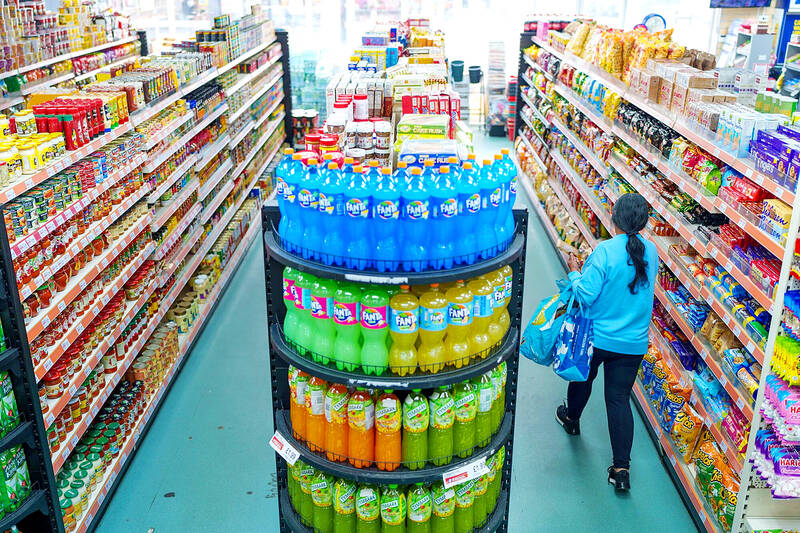Britain pulled out of a seven-month stint of double-digit inflation last month, but the sharp decline still marked the third consecutive month that price pressures have been stronger than feared.
The consumer price index (CPI) fell to 8.7 percent from 10.1 percent the previous month, the British Office for National Statistics said yesterday.
It marked the biggest drop in the annual inflation rate in more than 30 years. None of the 36 economists surveyed expected a reading that high.

Photo: Bloomberg
The figures are likely to fuel market expectations that the Bank of England (BOE) would extend its cycle of interest-rate hikes through the summer to stamp out price pressures.
The latest result was seen as a key crossroads determining whether the central bank could soon let up on the fight against inflation.
The latest CPI reading was helped by last year’s sharp increase in energy prices falling out of the comparison. Russia choked off supplies of natural gas to Europe after invading Ukraine, sending electricity prices spiraling higher across the continent.
Most concerning for the BOE, core inflation — which excludes volatile food and energy prices — accelerated unexpectedly to 6.8 percent, the highest since 1992 and up from 6.2 percent in March.
Natural gas and electricity combined contributed 1.8 percentage points of the fall in inflation.
However, the cost of telecommunications services, reflecting a jump in mobile phone bills, and alcohol and tobacco rose. The cost of used vehicles also rose.
“The rate of inflation fell notably as the large energy price rises seen last year were not repeated this April, but was offset partially by increases in the cost of second-hand cars and cigarettes,” ONS chief economist Grant Fitzner said.
“However, prices in general remain substantially higher than they were this time last year, with annual food price inflation near historic highs,” he added.
Grocery price inflation cooled slightly to 19 percent, but remained close to the highest rate in more than 45 years.
The BOE has blamed hedging by food producers and supermarkets rebuilding their profit margins again for keeping grocery inflation high, despite falls on global agricultural commodity markets.
BOE Governor Andrew Bailey has said the central bank is looking for “evidence” that inflation is coming down before it can “rest” on its most aggressive hiking cycle in four decades.
A total of 12 consecutive hikes by the BOE have lifted the key lending rate to 4.5 percent, the highest since 2008.
The BOE expects a sharp decline in UK inflation throughout this year, but is concerned about the persistence of price pressures even after the sharp decline in energy prices. Grocery bills have kept inflation elevated, the economy has been more resilient than expected, and the labor market remains extremely tight, fueling pay pressures.
“The IMF said yesterday we’ve acted decisively to tackle inflation but although it is positive that it is now in single digits, food prices are still rising too fast,” British Chancellor of the Exchequer Jeremy Hunt said. “So as well as helping families with around £3,000 [US$3,728] of cost-of-living support this year and last, we must stick resolutely to the plan to get inflation down.”

Intel Corp chief executive officer Lip-Bu Tan (陳立武) is expected to meet with Taiwanese suppliers next month in conjunction with the opening of the Computex Taipei trade show, supply chain sources said on Monday. The visit, the first for Tan to Taiwan since assuming his new post last month, would be aimed at enhancing Intel’s ties with suppliers in Taiwan as he attempts to help turn around the struggling US chipmaker, the sources said. Tan is to hold a banquet to celebrate Intel’s 40-year presence in Taiwan before Computex opens on May 20 and invite dozens of Taiwanese suppliers to exchange views

Application-specific integrated circuit designer Faraday Technology Corp (智原) yesterday said that although revenue this quarter would decline 30 percent from last quarter, it retained its full-year forecast of revenue growth of 100 percent. The company attributed the quarterly drop to a slowdown in customers’ production of chips using Faraday’s advanced packaging technology. The company is still confident about its revenue growth this year, given its strong “design-win” — or the projects it won to help customers design their chips, Faraday president Steve Wang (王國雍) told an online earnings conference. “The design-win this year is better than we expected. We believe we will win

Chizuko Kimura has become the first female sushi chef in the world to win a Michelin star, fulfilling a promise she made to her dying husband to continue his legacy. The 54-year-old Japanese chef regained the Michelin star her late husband, Shunei Kimura, won three years ago for their Sushi Shunei restaurant in Paris. For Shunei Kimura, the star was a dream come true. However, the joy was short-lived. He died from cancer just three months later in June 2022. He was 65. The following year, the restaurant in the heart of Montmartre lost its star rating. Chizuko Kimura insisted that the new star is still down

While China’s leaders use their economic and political might to fight US President Donald Trump’s trade war “to the end,” its army of social media soldiers are embarking on a more humorous campaign online. Trump’s tariff blitz has seen Washington and Beijing impose eye-watering duties on imports from the other, fanning a standoff between the economic superpowers that has sparked global recession fears and sent markets into a tailspin. Trump says his policy is a response to years of being “ripped off” by other countries and aims to bring manufacturing to the US, forcing companies to employ US workers. However, China’s online warriors